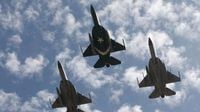On May 7, 2025, tensions between India and Pakistan escalated dramatically as the Pakistan Air Force (PAF) claimed to have shot down three Indian Air Force jets in retaliation for India’s recent airstrikes targeting multiple locations within Pakistan. This incident marks a significant increase in hostilities between the two nuclear-armed neighbors, reminiscent of the conflicts of previous decades.
According to reports from the Pakistani military, the Indian airstrikes, dubbed 'Operation Sindoor', targeted nine locations believed to be associated with terrorist activities in Pakistan and Pakistan-occupied Kashmir. The strikes were described as the deepest incursion by India into Pakistan’s territory since the Indo-Pakistani war of 1971, highlighting the severity of the current situation.
Pakistan's Defence Minister Khawaja Asif confirmed that five Indian warplanes were downed, stating, "If these hostile acts are stopped... We will talk to India. We do not want this situation to escalate," as reported by Bloomberg. Lieutenant General Ahmed Sharif Chaudhry, a military spokesperson, elaborated that three Rafale jets, one Sukhoi SU-30, and one MIG-29 were among the aircraft brought down during the conflict.
Indian government sources corroborated that three fighter jets crashed in India-administered Kashmir, with reports of a wounded pilot being taken to the hospital. Meanwhile, Pakistani Minister of Information Attaullah Tarar indicated that one aircraft was shot down over the Akhnoor sector in Kashmir, while another fell in Ambala, India. Additionally, a drone was reportedly downed in the Jammu region.
The backdrop to this military escalation stems from an attack on April 22, 2025, in Pahalgam, where 26 people were killed by suspected militants. India has blamed Pakistan for this violence, alleging cross-border links without providing evidence. Pakistan has vehemently denied these accusations, calling for an impartial investigation.
Following the Pahalgam attack, both nations implemented a series of retaliatory measures. India suspended the crucial Indus Water Treaty with Pakistan, closed the only functional land border crossing, and revoked visas issued to Pakistani nationals. In response, Pakistan cancelled visas for Indians, closed its airspace to Indian airlines, halted trade, and suspended the Simla Agreement, a 1972 treaty aimed at resolving disputes between the two countries.
As the situation worsened, Pakistan's military reported that it had downed another Indian fighter jet on May 7, marking the third such incident in a single day. This comes amid reports of a blast in Srinagar, the largest city in Indian-administered Kashmir, which coincided with the Indian military operations against Pakistan.
Amid the escalating conflict, senior Indian officials have briefed counterparts in several countries, including the United States and the United Kingdom, regarding India's military actions. Indian National Security Adviser Ajit Doval provided a briefing to U.S. Secretary of State Marco Rubio, emphasizing that India's actions were precise and focused on dismantling terrorist infrastructure.
In stark contrast, Pakistan's information minister criticized India's actions as “cowardly attacks on innocent civilians and mosques,” asserting that the Pakistani Armed Forces would deliver a “crushing response” to the aggression. Tarar insisted that the sites targeted by India were civilian and not related to any armed groups, challenging India’s narrative of targeting terrorist camps.
As the conflict continues to unfold, the international community watches closely, concerned about the potential for a broader military confrontation in South Asia. The region has a long history of conflict, particularly over the disputed territory of Kashmir, which both nations claim in full but control in part.
In the wake of these developments, the Pakistani military has vowed to maintain its defensive posture, with all jets reportedly airborne during the recent operations. Lieutenant General Chaudhry remarked, "This cowardly and shameful attack was carried out from within India's airspace. They were never allowed to come and intrude into the space of Pakistan." This statement underscores the heightened rhetoric and military readiness on both sides.
The implications of this military engagement could be profound, affecting not only the bilateral relations between India and Pakistan but also the stability of the entire region. With both nations possessing nuclear capabilities, the potential for miscalculation or escalation remains a pressing concern.
As of now, India has not officially responded to Pakistan's claims regarding the downed jets or the broader military actions. The situation remains fluid, and the coming days will be crucial in determining whether diplomatic efforts can be revived to prevent further escalation.
In summary, the recent military engagements between India and Pakistan highlight the fragile state of peace in the region, exacerbated by historical grievances and ongoing conflicts. As both nations navigate this precarious situation, the hope for a peaceful resolution seems increasingly distant.





